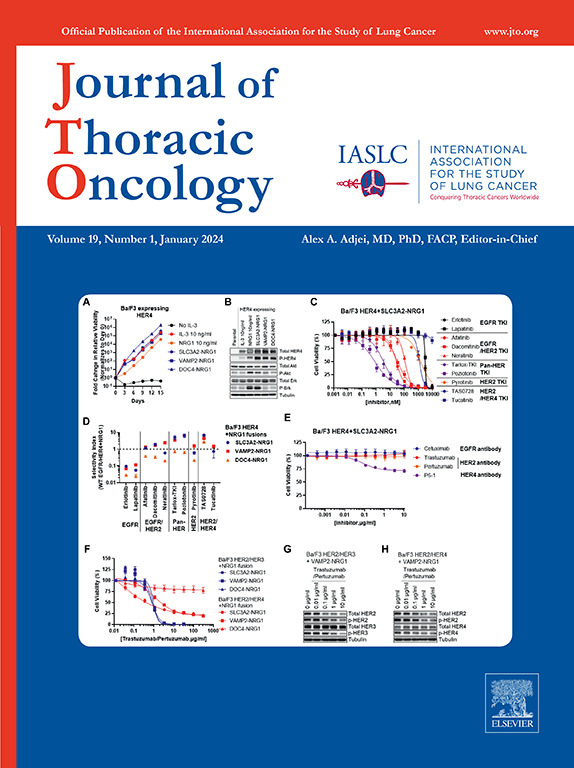The Use of Investigator-Assigned Subjective or Judgmental Efficacy and Toxicity Reporting in Early Phase Clinical Trials of Lung Cancer Treatments
IF 21
1区 医学
Q1 ONCOLOGY
引用次数: 0
Abstract
Introduction
Investigator-assigned Subjective or Judgmental Efficacy and Toxicity (ISJET) reporting represents language used to contextualize efficacy or toxicity data in clinical trials that may be inappropriate or misleading. In addition, pooling of grade 1 and 2 adverse events (AEs) may reflect a practice based on acute chemotherapy treatments rather than the expansion of chronic treatments that are now commonplace for many patients with lung cancer. In this study, we set out to evaluate the use of ISJETs and combined grade 1 and 2 reporting in early phase clinical trials of lung treatments at the 2024 American Society of Clinical Oncology (ASCO) Annual Meeting.
Methods
Phase I and II clinical trials of systemic treatments in adults with at least one patient with lung cancer presented at the 2024 ASCO Annual Meeting were reviewed. Baseline information and toxicity/efficacy reporting were collected. ISJETs were captured based on predefined phrases such as “tolerable,” “manageable,” “acceptable,” or “favorable.”
Results
A total of 100 eligible studies were identified. The median sample size was 43 (interquartile range 29–73), and 61 studies (61%) were phase I trials. Most studies reported any-grade (99%) and grade 3 (96%) AEs. Only 12% of the studies distinguished between grade 1 and 2 AEs. ISJETs were used to report toxicity in 88% and efficacy in 41% of the studies, respectively.
Conclusion
Most early phase lung cancer clinical trials presented at the 2024 ASCO Annual Meeting included ISJETs and did not distinguish between grade 1 and 2 AEs. Initiatives to increase objective efficacy and toxicity reporting language and more fit-for-purpose toxicity reporting are warranted.
在肺癌治疗的早期临床试验中使用研究者指定的主观或判断的疗效和毒性报告。
研究者指定的主观或判断性疗效和毒性(ISJET)报告代表了临床试验中用于将疗效或毒性数据置于背景下的语言,可能不适当或具有误导性。此外,1级和2级不良事件(ae)的汇总可能反映了一种基于急性化疗治疗的做法,而不是扩大慢性治疗,而慢性治疗现在对许多肺癌患者来说很常见。在这项研究中,我们在2024年ASCO年会上开始评估isjet和联合1级和2级报告在肺治疗早期临床试验中的使用。方法:回顾在2024年ASCO年会上发表的至少1例肺癌成人全身治疗的I期和II期临床试验。收集基线信息和毒性/疗效报告。is喷气机的捕获基于预定义的短语,如“可容忍的”、“可管理的”、“可接受的”或“有利的”。结果:确定了100项符合条件的研究。中位样本量为43例(IQR 29-73), 61例(61%)为I期试验。大多数研究报告了任何级别(99%)和3级(96%)ae。只有12%的研究区分了1/2级ae。分别在88%的研究中使用isjet报告毒性和41%的研究报告疗效。结论:在2024年ASCO年会上提交的大多数早期肺癌临床试验包括isjet,并且没有区分1级和2级ae。提高客观疗效和毒性报告语言以及更符合目的的毒性报告的倡议是必要的。
本文章由计算机程序翻译,如有差异,请以英文原文为准。
求助全文
约1分钟内获得全文
求助全文
来源期刊

Journal of Thoracic Oncology
医学-呼吸系统
CiteScore
36.00
自引率
3.90%
发文量
1406
审稿时长
13 days
期刊介绍:
Journal of Thoracic Oncology (JTO), the official journal of the International Association for the Study of Lung Cancer,is the primary educational and informational publication for topics relevant to the prevention, detection, diagnosis, and treatment of all thoracic malignancies.The readship includes epidemiologists, medical oncologists, radiation oncologists, thoracic surgeons, pulmonologists, radiologists, pathologists, nuclear medicine physicians, and research scientists with a special interest in thoracic oncology.
 求助内容:
求助内容: 应助结果提醒方式:
应助结果提醒方式:


